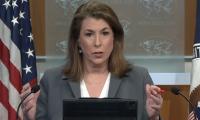leader, mainly because of his uncanny ability to unite diverse parties around the fundamentals of the rule of law and the constitution.
Nawabzada always used to say during the oppressed days of martial laws imposed by Ayub, Zia and Musharraf: “Either there is democracy or there’s no democracy.
There’s no third situation”. He was of the view that it would take the democratic system a long period to take roots in the country. He always held the army responsible for the fragility of the political system, saying if you uproot a plant (of democracy) every now and then to see whether it has taken roots, it will dry up and never grow.
I had the honor of staying very close to Nawab Sahib during the last six years of his life, being the Central Secretary Information of three opposition alliances namely Pakistan Awami Ittehad (PAI), Grand Democratic Alliance (GDA) and Alliance for Restoration of Democracy (ARD), being a nominee of Mohtarma Benazir Bhutto Shaheed. I had also travelled with Nawabzada during his last international trip along with Senior Journalist Sohail Warraich.
We remained with him during all the meetings with Mohtarma Benazir Bhutto and Mian Nawaz Sharif and learnt a lot from him. NNK travelled London, Dubai and Jeddah braving his fragile health for the sake of persuading Mian Nawaz Sharif and Mohtarma Benazir Bhutto to return to Pakistan for strengthening the movement against Pervaiz Musharraf as he was out of faith that it was high time to invigorate the movement and dislodge the Musharraf-led government. He also prepared the basic draft of Charter of Democracy.
Nawabzada Nasrullah Khan was born in Khangarh in 1918. He was educated at the Aitchison College, Lahore, from 1928 to 1933 and did his Senior Cambridge. He emerged as a student leader in politics around 1933. He had opposed the British Rulers and joined a revolutionary group ‘Majlis-e-Ihrar’ till the creation of Pakistan. He was present at the annual session of Muslim League held on 23rd March 1940 in which the famous ‘Lahore Resolution’ was passed.
After independence and partition in 1947, he joined the Muslim League party, from whose platform he successively won 1952 provincial and 1962 national assembly elections. It was during General Ayub Khan’s military rule (1958-68) that he made his mark on national politics.
He joined the opposition party, ‘Jinnah Awami League’ and later on this party was renamed as ‘Awami League’. He was selected as its vice president when Hussain Shaheed Suhrawardi was the president of the party. He strongly supported Mohtarma Fatima Jinnah in the Presidential Elections of 1964 against Ayub Khan.
Disenchanted by the heavy-handed military dictatorship, he set about gathering together all opposition parties under one banner. His first foray into building an opposition coalition resulted in the highly effective Democratic Action Committee, which prepared the ground for the fall of the seemingly solidly entrenched General Ayub in a popular uprising.
The success of this alliance became a model for other pro-democracy movements that he became involved in.
In 1969 he founded his own party with the collaboration of four other parties and named it as ‘Pakistan Jamhuri Party’ and became its Vice President. In 1977,
Nawabzada was one of the senior leaders of the Pakistan National Alliance in their campaign against Zulfiqar Ali Bhutto. In the elections of 1977 he was elected as the Member of the National Assembly but following the party policy refused to take oath. He was one of member who negotiated with the PPP government for holding new elections. But unfortunately when the government and the PNA had reached an agreement to hold fresh elections, Gen Zia imposed martial law. Nawabzada stood against Zia Martial Law.
The formation of the MRD was reflective of the Nawabzada’s political craftsmanship as the platform was shared by the PPP and the parties responsible for the ouster of the Bhutto government. In the 1980s, Nasrullah began assembling democratic forces to challenge the military rule of the general. This resulted in the formation of the Movement for the Restoration of Democracy (MRD), which developed into a highly successful grassroots pro-democracy movement. In 1983, the MRD launched a successful countrywide civil disobedience movement that was ruthlessly suppressed by the military regime. In this movement Thousands were killed or imprisoned.
The most retrogressive of the dictators, Zia-ul-Haq ensured that the Nawabzada remained under house arrest for a little under five years. During this time, efforts were made by government stooges to bend his will. And when that didn’t work, they tried to bribe him. But Nasrullah Khan remained steadfast and refused all overtures. He believed that whatever he was doing was right and that he should defend his principles with honour and dignity.
He participated in the presidential election of 1988 in which Ghulam Ishaq came out as winner while Nawabzada got 98 votes. In the elections of 1993 once again he was elected as the Member of National Assembly. He was made Chairman of Kashmir Committee.
The Nawabzada visited many countries at the head of a delegation to highlight the Kashmir cause. Because of his efforts the OIC summit at Casablanca had unanimously adopted a resolution seeking solution of the Kashmir dispute in accordance with the UN resolutions, ignoring the Shimla Accord which makes the dispute a bilateral issue. As a result of his efforts the Labour Party of Britain had included the Kashmir issue in its manifesto. The Nawabzada formed many alliances during his fifty years or so of active political career. He used to say that it is beyond a single party to challenge dictatorship and thus parties of all shades of opinion should join forces.
He likened the democratic struggle to construction of a house where bricks, gravel, steel, cement and even shrapnel are needed to complete the project His final act as an anti-establishment figure was the formation of the Alliance for the Restoration of Democracy (ARD) after General Musharraf seized power in a military coup in 1999, Nawabzada deftly succeeded to bring together two rival parties Pakistan Muslim League (N) and Pakistan Peoples Party under the banner of Alliance for Restoration of Democracy (ARD).
Nawabzada Nasrullah became the chairman of ARD, which opposed Legal Framework Order. His role has invariably been that of a catalyst, whether it involved taking up cudgels with a dictator, or exercising his uncanny ability to forge alliances out of often disparate political elements. And he always remained on the wrong side of the fence - in the opposition. The life history of NNK tells us that he remained in the heart of the movements, which proved to be in the interest of the country.
That is why he not only waged movements against those who usurped power in Pakistan. The way he brought the ARD and the MMA into the APC was marvelous. Nawabzada’s consummate skills as a deal-maker are missing today. He was of the view that there was no such thing as permanence in politics. There are no permanent friends or foes. Yesterday’s enemy could become a formidable ally today. Politics makes strange bedfellows.
He was also a poet, allergic to philistinism. He had a sharp memory, remembered thousands of verses, both Urdu and Persian, and would immediately come up with couplets to describe any situation.
Nawabzada was a politician in the true sense of the word. Politics was his vocation and his life. Nawabzada’s humility and simple living endeared him to people of all walks of life.
Many will remember the many years he spent in that large room in that modest house on Nicholson Road in Lahore, in which he lodged, boarded, held meetings and met visitors.
Unfortunately for the last 12 years not only the Burecrates, Businessman but also the Politicians are badly involved in corruption. Nawabzada was a glorious example of corrupt free politician. Certainly we are still missing Nawabzada Nasrullah Khan.
Salman Akram said that Imran wishes for public to be made aware of prevailing “lawlessness”
CM cautions that any hostile move by India under guise of this event would incur a heavy price
Yousafzai urged the apex court to set aside IHC ruling, arguing that it is contrary to facts on record
Rabbani strongly condemns India’s allegations of Pakistan’s involvement in Pahalgam incident without providing any...
“Now, India is targeting Pakistan through hydrological warfare,” says CM
Three judges from Sindh, Balochistan, and Lahore High Courts were transferred to IHC, drawing severe criticism







